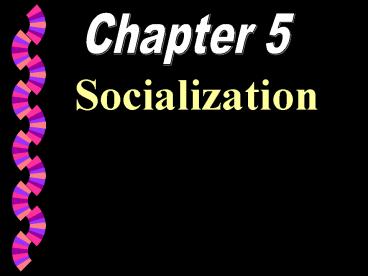Socialization - PowerPoint PPT Presentation
1 / 18
Title:
Socialization
Description:
What will we learn from this chapter? Abraham Maslow's Hierarchy of Needs ... like puppets responding to the backstage of 'social forces', which give us a culture and ... – PowerPoint PPT presentation
Number of Views:47
Avg rating:3.0/5.0
Title: Socialization
1
Chapter 5
Socialization
2
What will we learn from this chapter?
1.The meaning of Socialization 2. Human
Development- Nature vs. Nurture 3. The effects of
social isolation 4. Main contribution to the
understanding of Human Development 5. The
Agents of Socialization 6. Total Institution
Resocialization
3
Abraham Maslows Hierarchy of Needs
4
Social Experience The Key To Our Humanity
Socialization-Human Development
The lifelong social experience by which
individuals develop human potential and learn
patterns of their culture.
Personality A
persons fairly consistent patterns of thinking,
feeling and acting
Nature Vs. Nurture
Charles Darwin
John Watson
5
(No Transcript)
6
Social Isolation
Isolation DEATH
1. Effects of Social Isolation on
Non-human Primates 2. Effects of Social Isolation
on Children- Case Studies Anna,
Isabelle and Gennie
7
John Watson (1878-1958)- Behavior patterns are
not instinctive but learned
8
Understanding The Socialization Process
Sigmund Freud Elements of Personality a. Id
represents the human beings basic
drives b. Ego - a persons conscious efforts to
balance innate pleasure-seeking drives
with the demands of society c.
Super-ego - the operation of culture within
the individual
Jean Piaget Cognitive Development A. Studied how
people think and understand Biological
maturation social experience B. 4 Stages of
cognitive development 1. Sensorimotor,
2. Pre-operational, 3. Concrete-operational
and 4. Formal operational stages
9
Lawrence Kohlberg Moral Development1. Moral
development occurs in stages
Preconventional, Conventional, and
Postconventional stages.2.All his subjects were
boys.
Carol Gilligan Moral Development- Brought
gender into play.
George Herbert Mead the central concept is the
self self image self awareness, which
develops only thru social experience Charles
Cooley Looking-glass self, explains the
self-image developing thru how we think others
see us Meads concept of I and Me Social Self
develops through the interaction of I and Me by
taking the role of others put ourselves into
other peoples shoes, we develop self-awareness.
10
The Johari Window (Joseph Luft and Harry Ingham)
Known to self Not known to self
Open Self
Blind Self
Known to Others Not known to others
Hidden Self
Unknown Self
11
- Increase Self-Awareness
- Ask yourself about yourself
- Listen to others
- Actively seek information about yourself
- See your different self
- Increase your open self
12
Agents of Socialization
Mass Media
Schooling
Peer Groups
Family
13
ResocializationTotal Instituitions
Total Institution
A setting in which people are isolated from the
rest of society and manipulated by an
administrative staff
Resocialization
Radically altering an inmates personality
through deliberate manipulation of the
environment.
14
Need to Know Concepts and Glossary
Socialization The lifelong social experience by
which individuals develop human potential and
learn patterns of their culture. Personality A
persons fairly consistent patterns of thinking,
feeling, and acting. Self George Herbert Meads
term for a dimension of personality composed of
an individuals self-awareness and
self-image. Looking Glass Self Term for the
image people have of themselves based on how they
suppose others perceive them. Peer Group A
social group whose members have interests, social
position, and age in common. Cohort A category
of people with a common characteristic, usually
their age.
15
Discussion Questions
1. From socialization perspective, how do
you look at people doing bad things, such as
being bully, rude, selfish, egocentric to
committing crimes (abuse, violence, murder,
to Hijack, and suicide bombings) 2. Analyze the
Charles Andrew Williamss killing spree at
Santee High School California. ( Apply Freud,
Piaget, Mead, and Cooleys theories) 3.
16
3. What are the elements of human nature?
Based on your description about your own
personality, discuss the extent to which
these traits are the product of nature or
nurture. 4. Are We Free within Society? From
sociological perspective, human beings are
like puppets responding to the backstage of
social forces, which give us a culture and
shape our lives according to class, race,
gender, religion, sexual orientation, physical
condition and so on. Facing these social
forces, can we really claim to be free? Why
or Why not?
17
Quiz 5 individual format Chap 5 Socialization
Multiple Choices 1.__ Who developed the concept
of hierarchy of needs? a/ George
Herbert Mead b/ S. Freud c/ G. Piaget
d/ A. Maslow 2.__ In
lectures, Anna, Isabelle, and Genie cases
referred to a/ personality b/
socialization c/ social isolation d/
cognitive development 3.__ A persons fairly
consistent patterns of acting, thinking and
acting is a/ personality b/
values c/ socialization d/ cognitive
development 4.__ Carol Gilligans apporach
highlights ____ in moral development research
a/ gender b/ race c/ age
d/ family background 5.__ The self has two
parts a/ id and ego b/ id and
superego c/ I and Me d/ sex and
gender
18
True/False 6.__ Mead pointed out that self
develops only with social
experience 7.__ Looking-glass self refers to a
self-awareness based on how we think
other people see us 8.__ The self-image comes
from taking the role of the other. 9.__
The peers are the most important socialization
agent 10__ Superego balances between the Id and
Ego.































